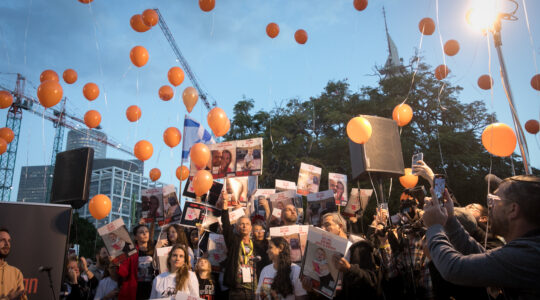The Washington Post op-ed page Wednesday has articles advocating two different approaches on Iran — both of which say the United States should de-emphasize the nuclear issue, but take completely opposite views on increased sanctions.
Columnist Robert Kagan, from the Carnegie Endowment of International Peace, says it would be "better if the administration focused on the regime’s instability and ignored the nukes":
This ought to be the goal of the "crippling" sanctions the Obama administration has threatened. Sanctions will not persuade the present Iranian government to give up its nuclear weapons program. Ahmadinejad and Khamenei see the nuclear program and their own survival as intimately linked. But the right kinds of sanctions could help the Iranian opposition topple these still-vulnerable rulers.
Critics of this idea still draw on pre-June 12 logic. A year ago, in the absence of any serious opposition to the clerics, it did seem hopeless to imagine that sanctions could have any effect on the clerics’ rule. One could speculate, as some administration officials and French Foreign Minister Bernard Kouchner still do, that sanctions would only strengthen popular support for the regime.
This analysis, however, no longer fits in Iran. The government’s behavior during and after the election has opened an irreparable breach between the regime and large elements of Iranian society, and even within the clerical ranks. The government may succeed in clamping down on the opposition and driving it underground. But the notion that the Iranian opposition will suddenly rally around Ahmadinejad and Khamenei if the West imposes sanctions is absurd. The opposition leadership is engaged in a struggle to the death with the regime. When sanctions begin to cause hardships, the opposition will press its case that the regime is leading Iran to ruin.
That is the case for moving ahead with crippling sanctions as soon as possible and not waiting months for Iran’s leaders to drag out talks. Will crippling sanctions topple the regime? Not necessarily. But the odds that the regime might fall given the right mix of internal opposition and foreign pressure are higher than the odds that it will give up its nuclear program voluntarily — probably much higher. The Obama administration prides itself on pragmatic realism. It ought to pursue the policy that has the higher chance of success.
Meanwhile, Andrew Albertson, executive director of the Project on Middle East Democracy, and Ali G. Scotten, the 2008-09 Huffington fellow at Georgetown University’s Institute for the Study of Diplomacy, argue — although not convincingly considering what has taken place in Iran since June 12 — that sanctions will unify its citizens behind the hardline government. Instead, they say the U.S. should "broaden the agenda" of talks with Iran to encompass "human rights":
First, President Obama should reiterate in an address (offered on YouTube, so Iranians can view it unfiltered) the benefits for average Iranians if Tehran lives up to its obligations with regard to its nuclear program: the opportunity to emerge from isolation, to have full diplomatic relations with the United States (which would include student and other civic exchange programs), and to benefit from international trade and investment. Second, the administration should make clear its desire for the agenda to include "full compliance with international human rights regimes" — by Iran, the United States and any other parties to the talks. To further engage the Iranian people, the administration should call for Iranian and international civil society organizations to take part in the dialogue.
This approach would strengthen reformers in Iran and increase pressure on the Ahmadinejad government. Pro-democracy dissidents such as Akbar Ganji have asked the international community to play a more active role by holding the Iranian government to a higher standard on human rights, one that would be more commensurate with the regional role and modern image to which Iran aspires.
Years of sanctions and threats have not weakened the regime. Attacking Iran only unifies its citizens behind its hard-liners. But what did strengthen our position was Obama’s clear message to the Iranian people this spring that the United States is not a threat to Iran and that it wishes to see the country emerge from diplomatic isolation. That message shifted Iranians’ focus to domestic issues, which include corruption, inflation and economic mismanagement. Rather than rallying people against the United States, this tactic got America out of the way and allowed the Iranian people to confront their unresponsive government on their own terms. Taking a public stance that is respectful of Iranian nationalism while strongly supportive of human rights would further empower and embolden the Iranian people.
JTA has documented Jewish history in real-time for over a century. Keep our journalism strong by joining us in supporting independent, award-winning reporting.





